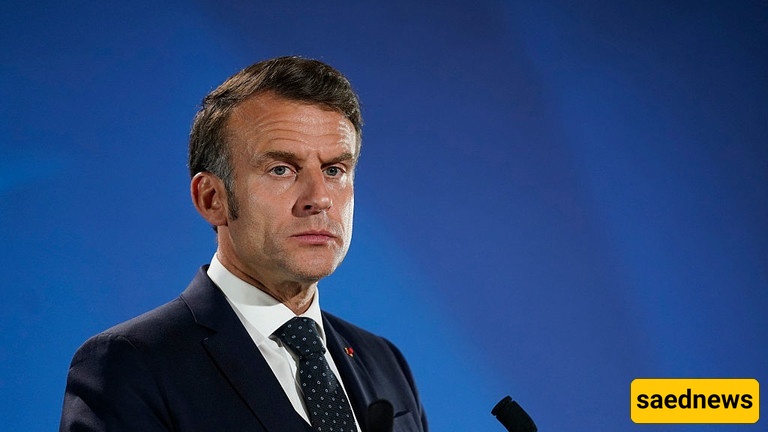SAEDNEWS: France is currently facing a case that challenges the boundaries between freedom of expression, national security, and religious sensitivities.

According to Saed News citing Russia Today, France is currently dealing with a case that challenges the boundaries between freedom of expression, national security, and religious sensitivities. A video of a Jewish clergyman named David Daniel Cohen was circulated on social media, in which he threatens French President Emmanuel Macron with death over the government’s decision to recognize the State of Palestine. Cohen said in this message: "He better prepare his coffin."
These statements, which included an accusation of "declaring war on God" directed at Macron, sparked a wave of reactions in France and beyond, prompting the country’s judiciary to take action.

According to French and international media reports, Cohen — who primarily speaks French and resides in Israel — recorded and posted this video message online following news of Macron’s decision to support the establishment of the State of Palestine. In this message, he not only condemned Macron’s policy but also issued a violent physical threat in a harsh tone.
France’s Ministry of the Interior, after monitoring this content, referred the case to the National Online Threat Reporting System (Pharos), and the Paris prosecutor’s office officially launched an investigation on charges of "threatening the person of the President."
The French government announced that it will vote to officially recognize the State of Palestine at the upcoming United Nations General Assembly. This decision was presented in Paris as a step toward "historical justice" and "a move towards sustainable peace," but it was met with strong negative reactions in Tel Aviv.
In a recent speech, Macron said, "Peace that is based on ignoring the rights of the Palestinian people will not be sustainable." This stance, while garnering support from some Middle Eastern countries, escalated diplomatic tensions with Israel and parts of its pro-Israel lobby in Europe.
France’s political and civil society swiftly responded to the threat.
The Representative Council of Jewish Institutions of France (CRIF) called Cohen’s statements "unacceptable" and "contrary to the principles of Judaism," emphasizing that political disagreements must be resolved through dialogue.
Interior Minister Gérald Darmanin described the threat against the president as "an attack on the institution of the Republic" and promised the case would be pursued "with full seriousness."
Political parties, including staunch critics of Macron, united in condemning any threats of violence against the president.
France hosts the largest Jewish population in Europe and has a history marked by both cultural achievements and wounds from anti-Semitism. Official statistics record more than 1,500 anti-Semitic incidents in 2024 alone.
In March 2025, an attack on a rabbi in Orléans sparked widespread condemnation, with Macron himself calling it "the poison of anti-Semitism." Now, a threat issued by a Jewish clergyman against the president complicates the equation further and raises sensitive debates about the limits of free speech, the security of officials, and the responsibility of religious leaders.
Macron’s decision on Palestine is linked to rising diplomatic pressure on Israel in Europe. Spain, Ireland, and Norway have previously taken similar steps, and with this move, Paris positions itself in a camp Tel Aviv views as threatening the legitimacy of its policies toward the occupied territories.
An open threat from a clergyman residing in Israel, regardless of the official stance of the Tel Aviv government, could cast a shadow over political relations between the two countries. Although Israel’s Foreign Ministry has not yet issued an official response, public and media pressure may compel it to react.
Under French law, threatening the life of the president is a serious crime punishable by long imprisonment. The challenge in this case is its transnational nature: the suspect lives outside France’s borders, in a country with complex diplomatic ties.
France can request investigation and interrogation through international judicial cooperation or Interpol, although enforcement depends on political relations and the will of the host country.
Jewish leaders in France worry this incident could be exploited by anti-Semitic groups. They strive to clearly separate individual actions from the community’s overall positions. This sensitivity is especially important in today’s polarized environment, as any misunderstanding could escalate social tensions.
This incident highlights several key points for the Élysée Palace:
The necessity of cybersecurity and monitoring threatening content before it escalates into a media crisis.
The importance of active engagement with religious communities to prevent misunderstandings and manage tensions caused by foreign policy decisions.
The value of coordinating with European allies on Middle East policy to share diplomatic costs collectively.
The death threat against Emmanuel Macron is more than an individual incident; it reflects the complexity of France’s relations with its Jewish community, Israel, and the Palestinian issue. This event demonstrates how foreign policy decisions can have direct repercussions on domestic security and social atmosphere.
France now faces the challenge of defending free speech, combating verbal violence, and respecting diplomatic sensitivities simultaneously. How this case is handled will affect not only the president’s security but also France’s international credibility and standing in the Middle East.

